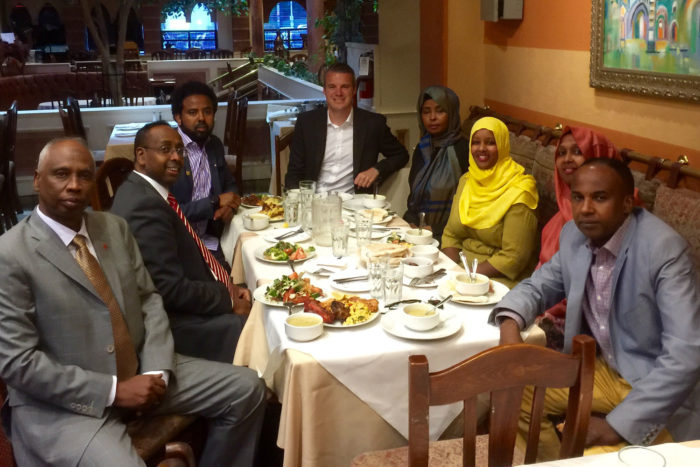
A diplomatic life is often one of contrasts. One year you can be working on climate change, another you’re promoting human rights in North Africa.
That’s what makes this career so varied and challenging. Sometimes this contrast can be so great it’s hard to see the thread that connects all of the work we do. My recent career has typified this existential angst. From Mogadishu to Ottawa. From body armour to Beaver Tails and poutine.
Having spent 14 months based at the UK’s Embassy in Somalia – the only European country with a permanent presence – I had seen both the pain of the past, while getting glimpses of a better future. I had seen girls return to school for the first time in 20 years and witnessed the suffering of those caught up in continuing violence. Somalia is making real progress, but it is fragile and often painful.
Taking up my posting in Ottawa I thought would be a complete contrast – walking to Parliament in Ottawa beats being cramped in the back of an armoured personal carrier any day. And the style of work is different. Being a UK diplomat in Canada is about trying to find ways two close allies can work even closer together on the challenges facing us in the 21st century. In Somalia, I was trying to help build the very foundations of the state after decades of civil war. Two separate worlds surely?
But in a globalised age, issues do not respect borders. A stable future for Somalia has local, regional and international repercussions. And it matters personally to the Somali diaspora around the world. A diaspora who have found a home and a future in Canada.
Finding myself in a Toronto restaurant breaking the Ramadan fast with members of Canada’s vibrant Somali community, my former life collided with the new. We spoke about our hopes for the Somali elections and discussed the best beaches in downtown Mogadishu. We talked about Toronto politics and their pride at the election of the first Canadian of Somali descent to Parliament. Growing up in stable countries can make you complacent about democracy. For Canadian-Somalis, the right to vote for leaders in peaceful elections was still a source of great pride. An opportunity that they hoped all Somalis would one day experience.
We also spoke about what it meant to be a modern Canadian. A nationality which is defined by values rather than ethnicity. The Canadian-Somalis I met felt accepted as part of the nation, while given space to celebrate their unique culture. And I sense this is the experience of so many here – a culture where many have a different heritage, but blend together to create something new (poutine is apparently great for breaking the Ramadan fast). And it is through this celebration of diversity that this amazing country gets its strength.
As a UK diplomat I want to get to know the modern face of Canada, to understand where we can work together to tackle shared challenges. This means taking the time to get outside the Ottawa ‘bubble’ and explore different provinces, cities and cultural identities within Canada.
Regardless of where a diplomat is based, be it Mogadishu or Ottawa, this approach will always be the thread that joins together the different lives of diplomats posted far from home.
